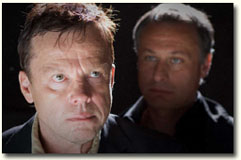|
Most Mankell admirers in the English-speaking world will
be familiar with the UK’s three-year series (2008, 2010 and 2012)
Wallander that is based on the 1990s novels with
Kenneth Branagh as Kurt Wallander. Less known is
the second Swedish series featuring Krister Henriksson
as Wallander, the first in 2005 and 2006, the second in
2009 and 2010. Although the UK films are graced with a
glossy cinematography and are a showcase for its star,
the strengths of the Swedish series outweigh those in
the UK productions, rendering it superior television.
Critics at Large, Canada:
The Swedish series, apart from the first episode,
"Before the Frost," in which Linda (Johanna Sallstrom)
becomes a member of the Ystad police force on September
11, 2001, is based on stories written by Mankell and
scripted by a variety of Swedish writers, dramas that
powerfully illuminate the social problems confronting
contemporary Sweden in the twenty-first century. I
suggest that Krister Henriksson, an older and less
unkempt Wallander, offers a more nuanced and understated
interpretation: he is stunningly intuitive as an
investigator and as an interviewer, and often right as
he confronts the doubts of his colleagues.

* * * * *
"Mastermind" works to earn its status as a theatrical
release, everyone upping their game to provide something
more filmic than the other direct-to-DVD entries in the
series. That’s not to say the other films in the series
are bad — they’re certainly as well-produced as any
other detective series on TV — but this episode seems to
have been constructed from the outset with an eye on a
stand-alone cinema release, rather than just randomly
plucking an episode from the thirteen produced to
receive such an honor.
From the start there are slicker opening titles, and
longer end credits to bookend that. The direction is
flashier too — still grounded in reality, unlike the
heavily-stylized British Wallander, but with more filmic
shot choices and editing. Take, for example, the Rear
Window-inspired scene where Wallander looks out over the
adjacent block of flats while listening to classical
music that completely fills the soundtrack — not the
kind of sequence you tend to find in TV drama. On-going
subplots from the series go unreferenced — there’s no
need to have seen a single other episode to follow the
story without a hitch.
The main plot’s on a bigger scale — a serial murderer
who has eyes and ears inside the police department — and
This Time It’s Personal for good measure, with the
villain targeting friends and family and (spoiler) a
past connection to several characters. It’s not a
realistic-scale case-of-the-week, but a once-in-a-career
unusual case, the kind of plot that graces serial killer
films ("Se7en" comes to mind, obviously) in a way those
case-of-the-week plots rarely do. It stretches
credibility a little, as these types of tale often do,
which does at times leave it feeling a tad out of place
in Wallander’s grounded world, which is usually about
more realistic murders rather than megalomaniac
super-powerful serial killers. Still, it ups the ante
appropriately, making the events more action-packed and
conforming to the theory that films should never have a
“just another day at the office”-style plot.
With the extra effort afforded to make this series
instalment appropriately cinematic, the Wallander team
achieve their aim and produce one of the stand-out of
all thirteen films. That said, some viewers of the whole
series may find it a bit OTT when compared to the
series’ regular style.
 |